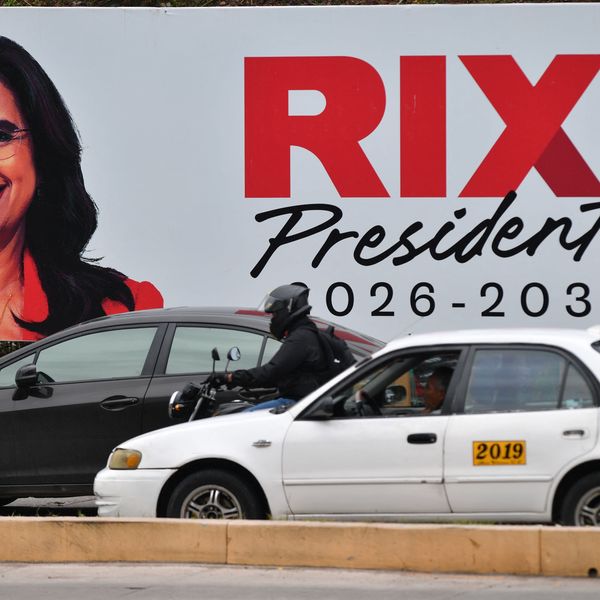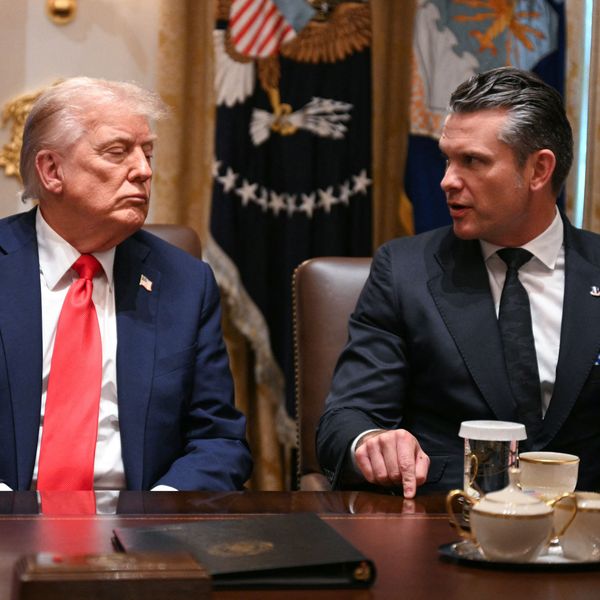Obama's Latin America Policy Not Too Different from Bush's
This week is the second anniversary of the military coup in Honduras, an occasion to review the Obama Administration's disappointing approach toward Latin America.
On June 28, 2009, Honduran President Manuel Zelaya was forcibly dispatched on a plane to Costa Rica. Over the past two years, the junta and its successor regime (elected in dubious circumstances) have engaged in harsh repression.
This week is the second anniversary of the military coup in Honduras, an occasion to review the Obama Administration's disappointing approach toward Latin America.
On June 28, 2009, Honduran President Manuel Zelaya was forcibly dispatched on a plane to Costa Rica. Over the past two years, the junta and its successor regime (elected in dubious circumstances) have engaged in harsh repression.
"More than 300 opposition members have been killed, according to human rights groups," Professor Dana Frank writes in a recent op-ed for the Progressive Media Project. "Impunity reigns. You can drive by and shoot a teacher, an indigenous activist or a trade unionist, and nothing--nothing--will happen to you."
The Obama Administration has largely consented to this disruption of democracy. After an initial period of finger-wagging and suspension of some aid, it accepted the overthrow of an elected government.
The United States "went from indignation with the coup to indifference, confusion, and, finally, acquiescence, all in less than five months," said Kevin Casas-Zamora of the centrist Brookings Institution.
Why this change?
Some of it was Republican pressure. S.C. Senator Jim DeMint held up for months the nomination of Arturo Valenzuela, the assistant secretary of state for the Western Hemisphere, to force the Obama Administration rightward on Honduras.
But there have been ideological reasons, too. Zelaya committed the sin of allying himself with Venezuela's Hugo Chavez and Bolivia's Evo Morales, both haughtily dismissed by Valenzuela as leftist populists when I met with him last year. ( Valenzuela, a relatively liberal ex-Georgetown professor, also claimed positive results in the region for the free-market model "that many on the left in Latin America rail against.") 509
Indeed, a primary focus of the Obama Administration's policy has been to contain Chavez and Morales. To that end, it has strengthened its alliance with Colombia, a country with a hideous human rights record. In October 2009, the United States signed an agreement with Colombia for leasing seven military bases in the country. A U.S. Air Force document detailed in a Progressive story last years reveals that a main purpose of the accord is to give the United States the ability to conduct "full-spectrum operations" against various threats, including "anti-U.S. governments." (The agreement is currently in limbo due to the lukewarm attitude of the new Colombian government.)
And then there's Cuba. Though President Obama has loosened the economic embargo a bit by easing travel and remittance restrictions, this is still a far cry from undoing the economic strangulation of Cuba that the United States has been carrying out since 1962. (The hypocrisy of the idea that this is to advance human rights is further exposed by the contrast with U.S. policy toward Honduras.)
Sure, there have been positives since President Obama came to power. He is well liked in Latin America for his stark personal contrast with his predecessor, though his popularity is dropping. And Latin American countries have less fear of an invasion or blatant subversion from the United States.
But much of the Obama Administration's attitude toward Latin America remains the same as that of previous ones. It refuses to relinquish U.S. dominance and to stop imposing the free-market model.
Until the United States discards these obsessions, fundamental change won't come to U.S. policy toward Latin America.
An Urgent Message From Our Co-Founder
Dear Common Dreams reader, The U.S. is on a fast track to authoritarianism like nothing I've ever seen. Meanwhile, corporate news outlets are utterly capitulating to Trump, twisting their coverage to avoid drawing his ire while lining up to stuff cash in his pockets. That's why I believe that Common Dreams is doing the best and most consequential reporting that we've ever done. Our small but mighty team is a progressive reporting powerhouse, covering the news every day that the corporate media never will. Our mission has always been simple: To inform. To inspire. And to ignite change for the common good. Now here's the key piece that I want all our readers to understand: None of this would be possible without your financial support. That's not just some fundraising cliche. It's the absolute and literal truth. We don't accept corporate advertising and never will. We don't have a paywall because we don't think people should be blocked from critical news based on their ability to pay. Everything we do is funded by the donations of readers like you. Will you donate now to help power the nonprofit, independent reporting of Common Dreams? Thank you for being a vital member of our community. Together, we can keep independent journalism alive when it’s needed most. - Craig Brown, Co-founder |
This week is the second anniversary of the military coup in Honduras, an occasion to review the Obama Administration's disappointing approach toward Latin America.
On June 28, 2009, Honduran President Manuel Zelaya was forcibly dispatched on a plane to Costa Rica. Over the past two years, the junta and its successor regime (elected in dubious circumstances) have engaged in harsh repression.
"More than 300 opposition members have been killed, according to human rights groups," Professor Dana Frank writes in a recent op-ed for the Progressive Media Project. "Impunity reigns. You can drive by and shoot a teacher, an indigenous activist or a trade unionist, and nothing--nothing--will happen to you."
The Obama Administration has largely consented to this disruption of democracy. After an initial period of finger-wagging and suspension of some aid, it accepted the overthrow of an elected government.
The United States "went from indignation with the coup to indifference, confusion, and, finally, acquiescence, all in less than five months," said Kevin Casas-Zamora of the centrist Brookings Institution.
Why this change?
Some of it was Republican pressure. S.C. Senator Jim DeMint held up for months the nomination of Arturo Valenzuela, the assistant secretary of state for the Western Hemisphere, to force the Obama Administration rightward on Honduras.
But there have been ideological reasons, too. Zelaya committed the sin of allying himself with Venezuela's Hugo Chavez and Bolivia's Evo Morales, both haughtily dismissed by Valenzuela as leftist populists when I met with him last year. ( Valenzuela, a relatively liberal ex-Georgetown professor, also claimed positive results in the region for the free-market model "that many on the left in Latin America rail against.") 509
Indeed, a primary focus of the Obama Administration's policy has been to contain Chavez and Morales. To that end, it has strengthened its alliance with Colombia, a country with a hideous human rights record. In October 2009, the United States signed an agreement with Colombia for leasing seven military bases in the country. A U.S. Air Force document detailed in a Progressive story last years reveals that a main purpose of the accord is to give the United States the ability to conduct "full-spectrum operations" against various threats, including "anti-U.S. governments." (The agreement is currently in limbo due to the lukewarm attitude of the new Colombian government.)
And then there's Cuba. Though President Obama has loosened the economic embargo a bit by easing travel and remittance restrictions, this is still a far cry from undoing the economic strangulation of Cuba that the United States has been carrying out since 1962. (The hypocrisy of the idea that this is to advance human rights is further exposed by the contrast with U.S. policy toward Honduras.)
Sure, there have been positives since President Obama came to power. He is well liked in Latin America for his stark personal contrast with his predecessor, though his popularity is dropping. And Latin American countries have less fear of an invasion or blatant subversion from the United States.
But much of the Obama Administration's attitude toward Latin America remains the same as that of previous ones. It refuses to relinquish U.S. dominance and to stop imposing the free-market model.
Until the United States discards these obsessions, fundamental change won't come to U.S. policy toward Latin America.
This week is the second anniversary of the military coup in Honduras, an occasion to review the Obama Administration's disappointing approach toward Latin America.
On June 28, 2009, Honduran President Manuel Zelaya was forcibly dispatched on a plane to Costa Rica. Over the past two years, the junta and its successor regime (elected in dubious circumstances) have engaged in harsh repression.
"More than 300 opposition members have been killed, according to human rights groups," Professor Dana Frank writes in a recent op-ed for the Progressive Media Project. "Impunity reigns. You can drive by and shoot a teacher, an indigenous activist or a trade unionist, and nothing--nothing--will happen to you."
The Obama Administration has largely consented to this disruption of democracy. After an initial period of finger-wagging and suspension of some aid, it accepted the overthrow of an elected government.
The United States "went from indignation with the coup to indifference, confusion, and, finally, acquiescence, all in less than five months," said Kevin Casas-Zamora of the centrist Brookings Institution.
Why this change?
Some of it was Republican pressure. S.C. Senator Jim DeMint held up for months the nomination of Arturo Valenzuela, the assistant secretary of state for the Western Hemisphere, to force the Obama Administration rightward on Honduras.
But there have been ideological reasons, too. Zelaya committed the sin of allying himself with Venezuela's Hugo Chavez and Bolivia's Evo Morales, both haughtily dismissed by Valenzuela as leftist populists when I met with him last year. ( Valenzuela, a relatively liberal ex-Georgetown professor, also claimed positive results in the region for the free-market model "that many on the left in Latin America rail against.") 509
Indeed, a primary focus of the Obama Administration's policy has been to contain Chavez and Morales. To that end, it has strengthened its alliance with Colombia, a country with a hideous human rights record. In October 2009, the United States signed an agreement with Colombia for leasing seven military bases in the country. A U.S. Air Force document detailed in a Progressive story last years reveals that a main purpose of the accord is to give the United States the ability to conduct "full-spectrum operations" against various threats, including "anti-U.S. governments." (The agreement is currently in limbo due to the lukewarm attitude of the new Colombian government.)
And then there's Cuba. Though President Obama has loosened the economic embargo a bit by easing travel and remittance restrictions, this is still a far cry from undoing the economic strangulation of Cuba that the United States has been carrying out since 1962. (The hypocrisy of the idea that this is to advance human rights is further exposed by the contrast with U.S. policy toward Honduras.)
Sure, there have been positives since President Obama came to power. He is well liked in Latin America for his stark personal contrast with his predecessor, though his popularity is dropping. And Latin American countries have less fear of an invasion or blatant subversion from the United States.
But much of the Obama Administration's attitude toward Latin America remains the same as that of previous ones. It refuses to relinquish U.S. dominance and to stop imposing the free-market model.
Until the United States discards these obsessions, fundamental change won't come to U.S. policy toward Latin America.

